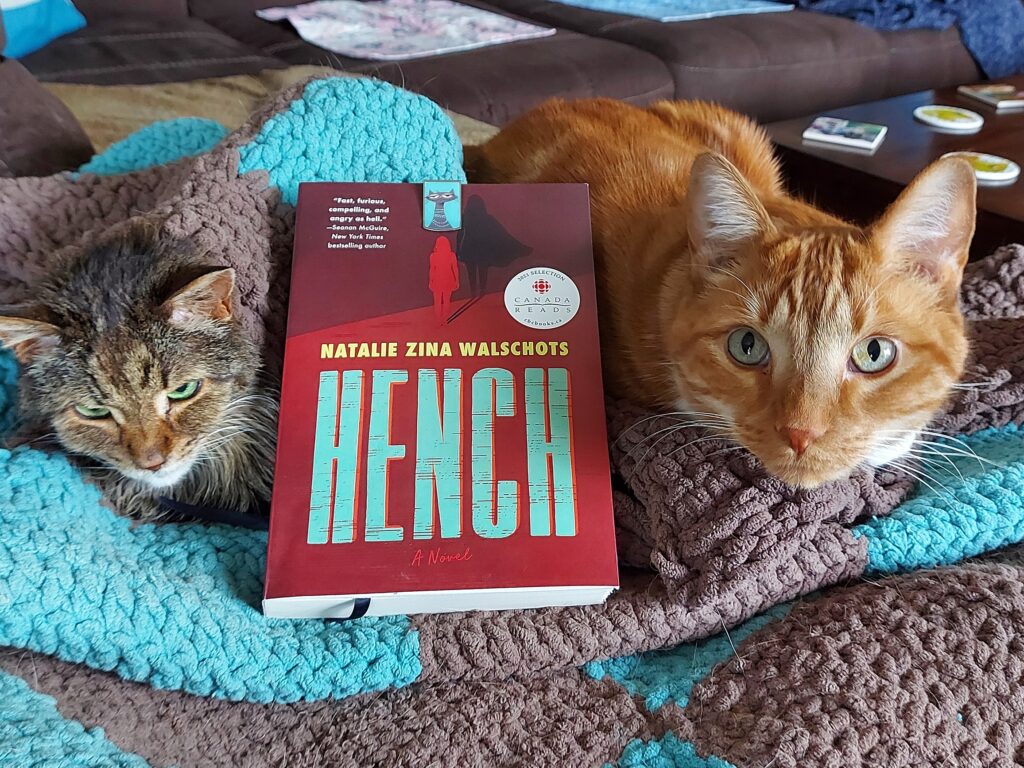Hench by Natalie Zina Walschots

Hench is an entertaining novel set in an alternate reality where some people are born with “superabilities” and they grow up to become either superheroes or villains. But Hench questions whether there is really a difference between superheroes and villains. Are superheroes really any better than villains, or are they just as bad, or worse, for society as villains?
The protagonist of the novel, Anna Tromedlov, works as a Hench at a temp agency. As a Hench, she is hired by villains to do office work (I would never have thought that villains would need office temps). She is very smart and good at collating and processing data. Why she works as a Hench did not seem very clear to me at the beginning, as she is not a bad person. She actually has a strong sense of morality. It is not until she has a bad encounter with the greatest superhero in the world, Supercollider, that her motivations for working as a Hench become more concrete. She gets caught up as a bystander in a kidnapping plot by the latest villain she is working for when Supercollider shows up. He does not pay much attention to her, since she is a low-level Hench, but when he moves her out of his way, Anna describes it as being hit by a truck. She ends up badly injured with a shattered femur, needing a blood transfusion, emergency surgery and a metal rod inserted in her leg.
Anna spends months recuperating from her injuries after being “Supercollided” on her best friend’s couch while her life falls apart around her; she has no job, no money, and loses her apartment because she cannot pay rent. She has a lot of time to stew in misery and anger over what Supercollider did to her, and she begins to wonder how many more people have had their lives ruined because of him. So, she begins researching every instance that Supercollider was mentioned in the news and she starts calculating the number of “lifeyears” that Supercollider has cost people, not just villains and Henches but innocent bystanders, and the cost of all the property damage he has caused. The numbers do not lie: Supercollider causes more collateral damage than any villain that he fights against. Anna starts collecting the same data for other superheroes and puts it all online for other people to see, and eventually people start to take notice, including the worst villain in the world, Leviathan, who has a special hate-on for Supercollider. Leviathan offers Anna a job to keep collecting data about the superheroes and this leads to her becoming the head of a task force whose sole purpose is to ruin superhero lives and expose the superheroes for the terrible people that they actually are.
Anna is a complicated character that becomes somewhat difficult to root for as the novel progresses. At first, her motivation to expose the hypocrisy of superheroes is righteous, but as she settles into her job as Leviathan’s Hench, she starts to become villainous herself. She still has that sense of morality niggling at her, letting her know what she is doing is wrong, but she starts pushing that down. She becomes a formidable enough Hench that Supercollider finds it necessary to kidnap her and, proving what an asshole he really is, tries to have her lobotomized so she cannot continue to use her brain to conspire against superheroes.
Hench also examines the role of women in a superhero world, and it is not surprising that women are relegated to a supporting role. Supercollider’s partner, Quantum Entanglement, is actually more powerful than Supercollider, but she does not lead the fight against villains; her purpose is to make Supercollider look better. Anna and Quantum Entanglement team up at one point and talk about “policing” the superheroes, but I am not sure what I am supposed to take away from how that plotline ends. That women do not stand a chance of being leaders in a male-dominated world? That no one is good enough to be an example of how people should behave, because we all have the capacity to be “villains”? What is also disappointing is how Anna’s relationship with Leviathan seems to become a mirror for Quantum Entanglement’s relationship with Supercollider.
I was not expecting Hench to make me ponder things as much as it did, but I really enjoyed reading it, and can see why it was one of the 2021 Canada Reads finalists. Even if superhero stories are not your thing, I think that this novel is worth the read.